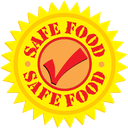Seniors and Food Safety: What’s a Senior to Eat? (FN699, Reviewed June 2021)
Availability: Web only
 Nutritionists agree a healthful diet includes a variety of foods.
Nutritionists agree a healthful diet includes a variety of foods.
Certain foods may pose a significant health hazard because of the level of bacteria present in the product’s raw or uncooked state for seniors. They should consume some foods with caution.
Potentially all food can cause a foodborne illness if not handled properly, but some foods pose more of a risk. Seniors have a weakened immune system and therefore should avoid these foods as much as possible:
- Raw fin fish and shellfish, including oysters, clams, mussels and scallops
- Refrigerated smoked seafood unless in a cooked dish, such as a casserole
- Raw or unpasteurized milk or cheese
- Soft cheeses such as feta, Brie, Camembert, blue-veined and Mexican-style cheese unless labeled “made with pasteurized milk”
- Hard cheeses, processed cheeses, cream cheese, cottage cheese or yogurt need not be avoided
- Raw or lightly cooked egg or egg products, including salad dressings, cookie or cake batter, sauces and beverages such as egg nog
- Hot dogs and luncheon meats, unless reheated until steaming hot
- Refrigerated meat spreads or pates
- Raw meat or poultry
- Raw alfalfa sprouts
- Unpasteurized or untreated fruit or vegetable juice
When fruits and vegetables are made into fresh-squeezed juice, harmful bacteria that may be present can become part of the finished product. Most juice in the United States — 98 percent — is pasteurized or otherwise treated to kill harmful bacteria. To help consumers identify unpasteurized
or untreated juices, the Food and Drug Administration requires a warning label on these products. The label says:
WARNING: This product has not been pasteurized and therefore may contain harmful bacteria that can cause serious illness in children, the elderly and persons with weakened immune systems.
Source: Adapted with permission from FDA/Center for Food Safety and Applied Nutrition, May 1999.
Developed in cooperation with AARP
For more information about food safety, visit the NDSU Extension website: www.ag.ndsu.edu/food

